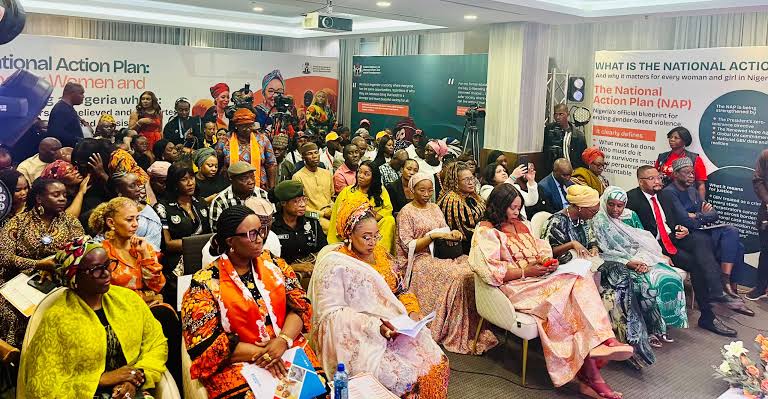Nigerian govt sets up emergency fund to tackle GBV

BY NEWS DESK, NOVEMBER 25, 2025 | 02:25 | 02:25 PM
The Federal Government says it will establish an Emergency Gender-Based Violence Response Fund to address Nigeria’s significant financing gaps in prevention and survivor support services.
Imaan Sulaiman-Ibrahim, Minister of Women Affairs, announced this at a high-level engagement on Monday in Abuja, to commemorate the 16 Days of Activism Against Gender-Based Violence (GBV).
The event was organised in partnership with Women for Women International, an international NGO.
Ms Sulaiman-Ibrahim said the establishment of the fund had become urgent as less than 0.5 per cent of the national budget currently went to GBV prevention and response, leaving safe spaces and survivor support centres severely under-resourced.
She decried the increasing cases of attacks on women and girls, including the recent abduction of schoolchildren in Kebbi and Niger States and the kidnapping of six female directors.
The minister described those incidents as a national emergency that underscored the vulnerability of women across the country.
She said GBV remained one of Nigeria’s most pervasive human rights violations, citing the National Demographic and Health Survey.
The survey, according to her, showed that 28 per cent of women aged 15 to 49 had experienced physical violence, while 40 per cent had suffered emotional abuse.
She added that in spite of rising reports, the national conviction rate remained below five percent.
The minister explained that the proposed response fund would form part of the Ministry’s 9-Pillar Renewed Hope Social Impact Intervention Programme.
According to her, the initiative seeks to strengthen institutions, expand safe spaces, and improve justice delivery through specialised gender desks and courts in every state.
She added that efforts were underway to raise the national GBV conviction rate from five per cent to 25 per cent by 2026, alongside plans to establish comprehensive support centres in every senatorial district.
Ms Sulaiman-Ibrahim commended recent landmark convictions and called for a compassionate review of Ochanya’s case to ensure justice was served.
She also urged government agencies, development partners, civil society organisations, traditional rulers, religious leaders, and the media to align with Nigeria’s National Action Plan.
Ending GBV, she said, was both a moral responsibility and a development priority essential for national stability and economic progress.
Beatrice Eyong, UN Women Representative in Nigeria, noted that while Nigeria had ratified key conventions and enacted laws such as the VAPP Act and Child Rights Act, enforcement remained weak.
She stressed the need for stronger legal implementation, ensuring perpetrators were held accountable, and expanding awareness programmes to help both women and men recognised and prevented GBV in all its forms.
Ms Eyong also underscored the importance of response systems, referencing one-stop centres set up through the Spotlight Initiative.
“These centres provide integrated services, including legal aid, healthcare, psychosocial support, and economic reintegration for survivors.”
She emphasised the critical roles of traditional leaders and men in promoting prevention and protection initiatives, alongside the use of technology and digital solutions to strengthen those efforts.
Thelma Ekiyor, CEO of Women for Women International, outlined the organisation’s structured Stronger Women, Stronger Nations programme, which provided 12 months of leadership training, economic empowerment, and community engagement.
Drawing lessons from 14 conflict-affected countries, Ekiyor emphasised five key areas: protection and safety, public awareness, strengthened legal enforcement, provision of shelters, and men’s engagement.
She added that Women for Women International was ready to collaborate with the Ministry of Women Affairs to implement those programmes, scale interventions, and make Nigeria a blueprint for regional gender-based violence prevention and response.
NAN
Appeal for support
Conflict Reporting is dangerous and risky. Our reporters constantly face life-threatening challenges, sometimes surviving ambushes, kidnap attempts and attacks by the whiskers as they travel and go into communities to get authentic and firsthand information. But we dare it every day, nonetheless, in order to keep you informed of the true situation of the victims, the trends in the conflicts and ultimately help in peace building processes. But these come at huge cost to us. We are therefore appealing to you to help our cause by donating to us through any of the following means. You can also donate working tools, which are even more primary to our work. We thank you sincerely as you help our cause.
Alternatively, you can also email us on
info@yen.ng or message us
via +234 803 931 7767


